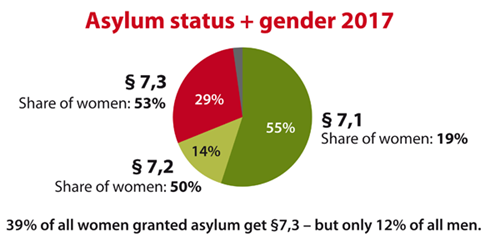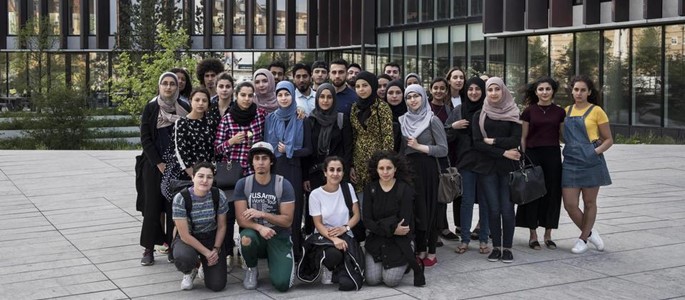More than 4,000 refugees in Denmark do not have free access to education
Legislation is unbalanced and unfair – affecting women in particular
FACTS
Refugees in Denmark granted asylum after art. 7(3):
2015: 1,068
2016: 2,475
2017: 789
2018: 151 (first 5 months)
Total: 4,483

Photo: Private photo from Panum by Sofie Mathiassen, brought in Politiken with an article by Sarah Chehri about Danish students with minority background
After being granted asylum in Denmark, you will be under the integration program (1-5 years) in a municipality, and the goal is learning Danish language and becoming self-supporting. Focus is on job training and jobs, but you also have the option of entering the education system – or finishing an education you followed in your home country. Refugees also have the right to Danish study allowance (SU).
Long term-stay
Access to education is however not free for that third of the refugees who since 2015 have been granted the so-called §7,3 status. It is almost exclusively given to Syrians, and more than half of them are women. This status also means a 3-year waiting period for family reunification – a restriction which has been assessed by the Danish Supreme Court and is now pending at the European Court of Human Rights.
The limited access to family reunification has raised a lot of attention in the media and abroad, but very few people have heard that the same group of refugees have to pay for education, which is free for other refugees, because it does not say “with the option of long term-stay” in their residence permit. Even a person who came through family reunification (§9) has free access to education.
Tuition fees
The demand for paying tuition fees includes both short, middle length and long higher education. Not all Danish institutions for education even accept students who must pay – for example University College Copenhagen enrols exchange students, but not private students. The prices vary a great deal between the educations who do that.
We have an example of a female refugee who already had the pharmacist education from Syria, she was told that the price for the study needed to qualify her at the Danish level was one year at 150,00 DKR. An engineer wanted a diploma: 7 semesters at 60,000 DKR each. A candidate at Copenhagen University costs 150,000 DKR paid in 4 rates, paid in advance for each semester. Even with a good job, this is not possible for a young refugee.
Read more about tuition fees at Students Refugees (where you can also get personal counselling) and Study in Denmark (for exchange students).
Discrimination
Refugees Welcome knows a pair of siblings from Syria, who arrived together in 2015. They were both in their twenties, and both had been forced to stop their university study in Syria because of the war. They were very shocked when they learned that the brother could continue his studies for free, but the sister had to pay for her education, which she was not able to.
The brother was granted asylum after article 7,1 because he ran away from forced conscription. His sister was granted 7,3 as women are not doing military service in Syria, and she had not been politically active. She ran away from the war, which is so dangerous, that no countries in Europe return Syrians to it. But to make sure that there is an easy option of sending them back once the situation in Syria improves a little, the Helle Thorning government introduced with support from Radikale and SF a new, weak asylum status given as a temporay protection from the general violence, with limited access to family reunification. The first Syrians received it in the spring of 2015, and have now been here for 3 years – nobody can say how many times it will be extended, depending on the war.
Women face special problems in the asylum system in many ways, and this is a clear example of discrimination, even though it is not on purpose. 39% of all women granted asylum receive the 7,3-status, where only 12% of the men get it (see graphic). Just under 30% of all asylum seekers are women. Many unaccompanied minors also get the 7,3-status, but very few are ready for higher education before turning 18. At 18, some will get their status changed to 7,1.
Education for the future
Every year, new refugees become fluent in Danish and apply to get into their dream study, in the hope of contributing and being useful in their new country – only to find out that this is impossible, and they have to look for an unskilled job instead. Many Syrian children and young persons are already lacking behind in access to school and education because of the war – and when some of them return one day, they would have been in a stronger position with an education from Denmark.
In Danish Parliament there is a general consent that young people should get an education – and many trades have a rising need for hands. Nonetheless, we now have 4,400 people who do not have actual access to education because of their asylum status. On top of that, there is a much larger amount of people who have that access, but choose to take an unskilled job instead, as a fulltime job is the only thing that counts when applying for permanent residence after 8 years in the country. Read Shamis' story here. Statistics show that second generation of non-Western immigrants study at the same level as young people with Danish parents.
Here are two obvious ideas to change legislation in a more sensible direction, to benefit both refugees and Denmark: make education free for all refugees and include education among the criteria for permanent residence permit.
As a member of Refugees Welcome you help us keeping an eye on how legislation targets refugees


